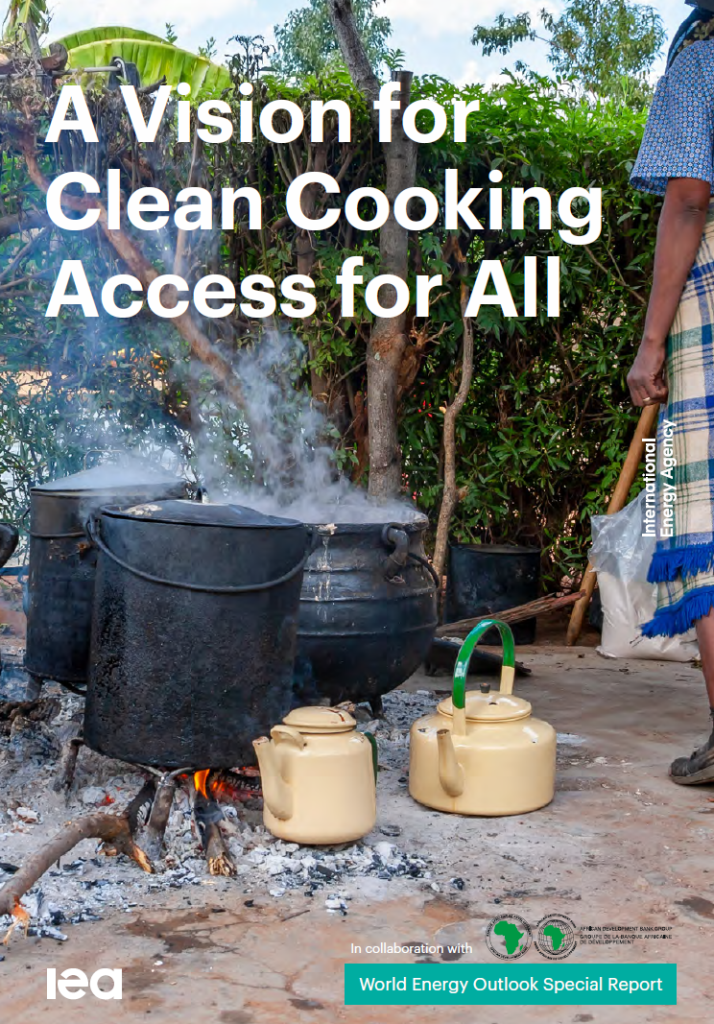- Date
- 26th July 2023
- Categories
By Dr Simon Batchelor (Gamos Ltd., Loughborough University) & Prof Matthew Leach

The IEA has just published a new report called a Vision for Clean Cooking Access for All. Alongside other reviewers, Modern Energy Cooking Services (MECS) Programme had the opportunity to comment on the draft, and we are delighted to see the attention given to clean and modern cooking. There was also a particularly clear launch webinar which can be found on YouTube and had 30,000 live viewers. But wait, before you listen to a whole hour of video, carry on reading below where we highlight some parts of the webinar and report.
We could leave you to read the report, but we are all busy, so we will use this space to point out five interesting elements of the report.
1- Making the problem clear
Any regular reader of the MECS website and its research will know the core issues of cooking and in particular its generalized impact on health. We said above that the report is connected to a particularly clear webinar and at 28 minutes (watch for 6 mins) Dr Maria Neira, Director Public Health, Environment and Social Determinants of Health, WHO describes clearly how particulates from low tier stoves impact health, not just in the lungs but in every organ of the body.
2- Calling for more finance…. from the oil and gas industry
The report is relatively conservative in whether the All Access scenario is decarbonized. They point to considerable use of LPG as a transition fuel and some portion of improved cookstoves up until 2030, by which time they expect some electric cooking. Electric cooking then continues to grow becoming the main source of clean cooking by 2050. We have sometimes wondered whether the oil and gas industry is lobbying international organisations to keep promoting LPG, but at 6 minutes (watch for 4 mins) Mr Fatih Birol, Executive Director of the IEA makes a very interesting observation about finances. It is him lobbying the oil and gas industry for more finances for clean cooking. He notes that by their calculations $8 billion per year is required to follow their All Access scenario, which initially sounds like a lot of money. However, he points out that the oil and gas industry was worth $4 trillion last year, and so if they put their weight behind this issue that affects a third of the world, it would only be 0.2% of their turnover.
3- No-regrets
There is a great line in the report, saying: “The switch to clean cooking fuels and technologies by 2030 is a no-regrets option when considered through a climate lens”. Keep in mind this comment is made in the context of the above point – that their All Access scenario continues to have a lot of LPG at its heart. At 21.48 minutes (watch for 4 mins) one of the authors, Ms Laura Cozzi, starts with showing the health and time savings (equivalent to the entire workforce of Japan!), and then moves on to emissions. She points out how even with significant use of LPG and non-renewable electricity generation, both of which add direct CO2 to the GHG emissions, there is a net reduction in emissions. Such use of fossil fuel would be substituting for biomass which has multiple emissions that affect climate change through incomplete combustion, including methane (more than 25 times as potent as carbon dioxide at trapping heat in the atmosphere), black carbon- a short lived climate forcing agent, and biomass also stimulates deforestation, where a cut down tree is a loss of carbon sequestration. By their calculations preventing trees loss more than offsets the added fossil fuel emissions.
4- Kenya eCooking Strategy
In response to a journalist’s question, at 47:48 (watch for 3 mins) Kevin Kariuki from the African Development Bank, talks about their investment in SPARK+, its investment in BURN, and the AfDB leveraging the eCooking strategy of Kenya to work with the utility KPLC, all of which have strong inputs from MECS research.
5- Leave no one behind (and carbon)
And finally in answer to a journalist’s question, at 53:14 (watch 3 mins) one of the other authors Dan Wetzel of the IEA points to its affordability, and that even very poor households have new and emerging opportunities through carbon finance, again something that MECS research has and is contributing to.
It is an important contribution as a report, and we hope that it stimulates more commitment to clean cooking both from politicians and from energy investors.